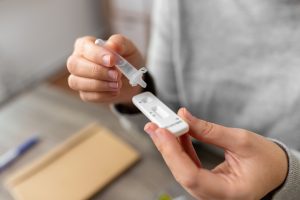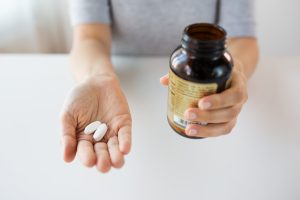Escherichia coli and Clostridium difficile are the most common UTI-causing bacteria that go through the urinary tract system to the bladder, leading to bladder infections, interstitial cystitis, and benign cystitis. Nitrofurantoin is a medication in the antibiotic drug class, and it is prescribed to treat bacterial infections in the urinary system. Is Nitrofurantoin a strong antibiotic?
Nitrofurantoin is a popular broad-spectrum medication that treats infections caused by bacteria. This antibiotic typically treats infections of the bladder, urinary tract, kidneys, and other organs caused by the Escherichia coli and Clostridium difficile bacterium.
This article discusses Nitrofurantoin, its uses, warnings, precautions, and FAQs. Read on to learn more about this medication and why doctors prescribe it.
What is Nitrofurantoin?
Nitrofurantoin is a prescription antibiotic medication that comes in oral capsule and oral suspension forms. This medication treats infections in the urinary system caused by bacteria.
Doctors may recommend using Nitrofurantoin to treat a bladder infection, kidney infection, or other infections in the urinary gut.
The drug is available under the brand name Macrobid and Macrodantin.
In addition, Nitrofurantoin is a generic drug that is less expensive than the brand-name version.
Generic versions of drugs may not be as potent as the brand-name versions. However, they are known to be widely effective in treating bacterial infections.
What is Nitrofurantoin used for?
As previously highlighted, Nitrofurantoin is an antibiotic medication that treats bacterial infections in the urinary system, including the bladder, kidneys, and gut.
According to the FDA, this drug shows good activity against UTIs caused by Enterobacter cystitis, Enterococcus, Klebsiella, Staphylococcus aureus, and Escherichia coli bacteria.
Nitrofurantoin is also used to treat mild lower UTIs, pyelitis, ear infections, or strep throat. It can also be used as a prevention medication against UTIs, especially after surgical treatments.
Despite its effectiveness against bacterial infections, Nitrofurantoin will not work for cold, flu, or other infections caused by a virus.
Using antibiotics when not required increases the risk factors of antibiotic-resistant bacterial infections- which can be pretty complicated to get rid of.
Types of antibiotics
Antibiotics are medications with antimicrobial properties that fight and kill bacteria. It is the most vital type of antibacterial agent for treating bacterial infections.
Antibiotics are also widely used to prevent bacterial infections because they limit or kill bacteria in the body.
There are several types of antibiotics, and they all work in different ways to eliminate or stop bacteria from multiplying. Antibiotics are grouped into the following:
- penicillins
- fluoroquinolones
- cephalosporins
- macrolides
- beta-lactams with increased activity (e.g., amoxicillin-clavulanate)
- tetracyclines
- trimethoprim-sulfamethoxazole
- lincosamides (e.g. clindamycin)
Is Nitrofurantoin a strong antibiotic?
Nitrofurantoin is a prescription antibiotic that treats lower urinary tract bacterial infections. This medication is active against most gram-positive and gram-negative bacteria.
As an antibiotic, Nitrofurantoin is primarily used in treating and preventing UTIs. While this medication is commonly prescribed for UTIs, it is not an optimal treatment option for kidney infections.
Nitrofurantoin is usually administered orally in capsule/tablet or suspension form.
When Nitrofurantoin is used, the medication is converted by nitroreductases in the body to electrophilic intermediates, which synthesize DNA, RNA, and protein and limit the citric acid cycle.
Is Nitrofurantoin a strong antibiotic? Yes, the medication is potent against a range of bacteria in the urinary tract system, such as E. coli, Enterococcus faecalis, & species of Klebsiella, Enterobacter, and Staphylococcus.
How does Nitrofurantoin work?
The way Nitrofurantoin works is different from other antibiotics. When used orally, most of the medications get filtered out of your blood and into your urine.
This helps the medication concentrate primarily on where the bacteria causing the infection are in the urinary system.
Nitrofurantoin eliminates the bacteria by penetrating their cells and destroying their genetic build-up so they can’t multiply or survive.
Typically, you should feel your symptoms ease within a few days of using the medication. However, you must continue using the medication until your course is complete for optimal effectiveness and to prevent recurring infection.
If you’re using Nitrofurantoin as a prophylaxis for UTI, you may need to continue usage for several months even if you feel well and don’t have any symptoms.
The Unique Features of Nitrofurantoin
The Food and Drug Administration approved Nitrofurantoin to treat uncomplicated UTIs in 1953. Nitrofurantoin works uniquely from other antibiotics.
This medication gets absorbed well in the body and is quickly cleared from the serum, producing subtherapeutic concentrations in serum but antibacterial concentrations in urine.
The current formation of the medication includes a rapidly absorbed monohydrate salt in a slow-release matrix and crystalline Nitrofurantoin, which is also absorbed slowly.
Children with any degree of kidney deficiency should be administered lower medication dosages.
Nitrofurantoin produces bactericidal qualities when the hydantoin ring with a nitro-substituted furanyl side chain is metabolized within the bacteria to produce reactive compounds.
This antibiotic mechanism is presumed to occur by changing the bacteria’s ribosomal proteins and other vital genetic structures.
This medication affects gram-positive bacteria (including staphylococci and streptococci) and gram-negative bacteria (E. coli, Klebsiella spp., and Citrobacter spp.).
Advantages and weaknesses of Nitrofurantoin
Nitrofurantoin is highly effective against bacteria in the urinary tract because the body rapidly filters it out of your blood, sending it to your urine.
After use, the medication is concentrated in the urinary system, eliminating harmful bacteria causing UTIs.
However, this means that Nitrofurantoin will not be effective against other infections.
Nitrofurantoin’s primary strength is its efficacy against UTIs due to the concentration of its substance in the urine, where the bacteria causing the infection are.
This same quality is why Nitrofurantoin will not work for infections other than UTIs.
In addition, bacteria Acinetobacter, Morganella, Proteus, Pseudomonas, and Serratia are typically resistant to the medication.
However, resistance to Nitrofurantoin is rare, and it works against several multidrug-resistant bacteria.
Nitrofurantoin for Urinary Tract Infections (UTIs)
Due to its uniqueness, Nitrofurantoin is primarily effective against UTIs but will not work for other infections.
When used, this medication is quickly filtered out of the blood and passed to the urine in the urinary system.
When Nitrofurantoin is concentrated in the bladder, it can eliminate and inhibit the growth of bacteria at the site of the infection.
If you’re taking Nitrofurantoin for urinary tract infections, your doctor would recommend you take it for 3-7 days.
However, for prevention against urinary tract infections, you may need to use the medication for several months. The FDA approved Nitrofurantoin to treat UTIs in 1953.
Cystitis and Pyelonephritis
Doctors can recommend Nitrofurantoin to treat cystitis (lower UTI). However, Nitrofurantoin is not effective against pyelonephritis (upper UTI).
Your doctor may recommend using Nitrofurantoin for 7 days to clear cystitis.
However, this medication should not be used to treat pyelonephritis or perinephric abscesses because it lacks a broader tissue distribution.
Read also: How and When to Use Pink Eye Antibiotics
Warnings, Precautions, and Safety of Nitrofurantoin
Nitrofurantoin is available in oral and suspension form as prescribed by a licensed healthcare professional. However, there are important warnings to note before using this antibiotic.
Lung inflammation
It is crucial to note that Nitrofurantoin may cause lung inflammation to occur.
This side effect of the medication is uncommon and is more likely if you take the drug for more than 6 months.
Signs of lung inflammation may include chills, coughs, chest pain, fever, tiredness, and shortness of breath.
You should immediately contact your healthcare expert if you notice these symptoms.
Liver problems
Liver inflammation or problem is also one of the possible side effects of Nitrofurantoin. This drug may cause liver injury or inflammation if you take it for long-term treatment.
Your healthcare expert will monitor your liver by testing your blood. You must inform your doctor if you notice symptoms of liver problems when using this medication.
These symptoms include yellowing of your skin, yellowing of the white of the eyes, nausea, vomiting, dark urine, loss of appetite, and itching.
Nerve injury
Nitrofurantoin may cause nerve injury in some patients. Nerve injury symptoms include pain and numbness, primarily in the hands and feet.
Red blood cell damage
In addition to other warnings, Nitrofurantoin may cause red blood cell damage called hemolysis. Symptoms of this condition include weakness, pale skin, and tiredness. Hemolysis will, in most cases, ease completely after discontinuing Nitrofurantoin.
Diarrhea
Like most antibiotics, Nitrofurantoin may cause diarrhea. You may experience mild or severe diarrhea from using Nitrofurantoin, which may cease after you stop using the drug.
If your diarrhea is severe and does not stop after discontinuing the drug, you must immediately call your doctor.
Your doctor will give you fluids to avoid severe dehydration and further antibiotic treatment options to eliminate the bacteria causing your condition.
Nitrofurantoin Side Effects
Nitrofurantoin is a potent antibiotic against urinary tract infections. However, the medication can cause some side effects.
Some of these side effects include:
Mild side effects of Nitrofurantoin
- Drowsiness
- loss of appetite
- diarrhea
- numbness
- weakness
- tiredness
- pain in your hand and feet
- vomiting
- Prolonged use may cause yeast infection
The side effects typically go away after a couple of days. However, you should contact your doctor if they persist longer.
Severe side effects
Nitrofurantoin can also cause severe side effects. It is vital to note how the drug makes you feel and immediately report to your doctor if you’re feeling unusual. Severe side effects may include:
Inflammation of the lungs
Symptoms: shortness of breath, chills, cough, chest pain, tiredness
Inflammation of the liver
Symptoms: nausea, vomiting, yellowing of the skin, loss of appetite, dark urine, itching
Nerve damage
Symptoms: weakened muscles, tingling or numbness in your hand and feet
Red blood damage (hemolytic anemia)
Symptoms: weakness, fatigue, pale skin
Diarrhea
Symptoms: stomach upset, bloody stools, loose or watery stools
Dosage
Your doctor will prescribe a suitable dosage for you after considering some factors. These factors include your age, health conditions, the severity, and the type of infection.
This medication tablet comes in 50mg or 100mg. The slow-release version of the drug is 100mg, while the liquid comes at 25mg in 5ml.
For UTI treatment in adults,
Your doctor may recommend 50mg taken as standard tablets 4 times a day or 100mg taken twice a day as slow-release capsules.
For UTI prevention in adults,
Your doctor may tell you to take 50mg to 100mg tablets daily at night to prevent UTIs.
A certified healthcare professional will determine the dosage for children depending on their ages and sizes.
It is vital to space out the duration of usage for more effectiveness. If you’re using the medication 4 times a day, you should use the first dose in the morning, midday, late afternoon, and before sleep.
If you use Nitrofurantoin twice daily, you should space the time evenly.
Nitrofurantoin drug interactions
Unlike other antibiotics, Nitrofurantoin doesn’t interact with a lot of medications. However, Nitrofurantoin interacts with probenecid, methotrexate, and magnesium-based antacids.
You must inform your doctor if you use these medications before using Nitrofurantoin.
In addition, macrobid, macrodantin, furadantin sulfinpyrazone, live tuberculosis vaccines (BCG vaccine), typhoid vaccines, and quinolone antibiotics have known interactions with Nitrofurantoin.
When to see a doctor
Nitrofurantoin is used for short or long-term treatment and prevention of UTIs. The medication’s brand names are Macrobid, Furandantin, Aratoin, and Macrodantin.
You must take the drug as a qualified healthcare professional specifies to avoid severe adverse effects that may harm your well-being. Ensure you use the drug as recommended.
If you fail to complete your prescribed course, your UTI may not go or worsen. If you stop using the drug abruptly without completing your treatment, the UTI will become resistant to the medication. This means that Nitrofurantoin will not work for you anymore.
Read also: Which Antibiotic Medication Is Best for BV Treatment?
Frequently Asked Questions
Nitrofurantoin is highly effective against urinary tract infections caused by bacteria and has a low risk of inducing bacterial resistance.
Due to its unique mechanism of action, this medication works differently from other antibiotics. Nitrofurantoin typically gets rapidly filtered out of the blood and concentrated in the urine, eliminating bacteria causing the UTI.
Long-term use may cause some severe side effects, including lung damage.
Rocephin is an antibiotic used to treat several bacterial infections. This medication is a cephalosporin antibiotic, and it eliminates bacteria in the body. Doctors may prescribe Rocephin to treat meningitis, pneumonia, or E. coli.
Nitrofurantoin is usually prescribed to treat uncomplicated urinary tract infections. The medication is typically rapidly filtered out of the blood and into the urine, where it stays concentrated, killing infectious bacteria.
This medication should not be used to treat kidney or upper respiratory infections because it cannot reach the required therapeutic concentrations in the kidney to be effective against bacteria.
Therefore, Nitrofurantoin should not be used for infections outside of the bladder.
Nitrofurantoin is highly effective against urinary tract infections. This medication has a short-term therapy but acts rapidly on bacteria and often requires 3-7 day treatments.
Some patients notice improvements in the first 24 hours of taking Nitrofurantoin, and UTI symptoms fully ease after 3 days. You should inform your doctor if symptoms persist after 3 days of treatment.
Nitrofurantoin is generally well-tolerated and rarely causes harmful side effects. The most common side effects of the medication include nausea, vomiting, headache, and diarrhea.
Severe side effects may include liver damage, nerve injury, or damage to the respiratory system.
You must speak to your doctor before using Nitrofurantoin to avoid the harmful adverse reactions of the drug.
You must let your doctor know the latest news on all the drugs and supplements you’re taking before using Nitrofurantoin.





